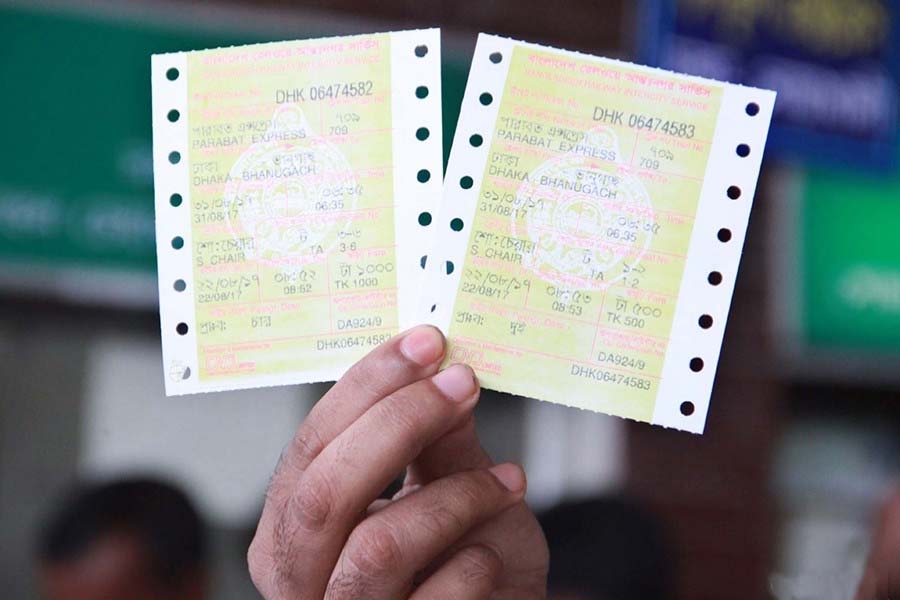
UNB, Dhaka :
Zakir Hossain, a Dhaka-based doctor, travels to Rajshahi by train at least four times a month. He is doing an MPhil at Rajshahi University.
“I love to travel by train as it is safe, comfortable and affordable too,” said Zakir.
Of late he has some complaints too.
“Buying a ticket online is proving to be a big headache for me,” said Zakir. “It is not as easy as it was before.”
In conversation with this UNB correspondent recently he complained that he has to buy tickets from black market as online tickets are not always available.
“Since I have to travel to the university, I collect tickets from the black market at a slightly higher price,” he said.
“The railway authorities must look into this corrupt practice in the interest of the passengers,” Zakir suggested.
He echoed the feelings of many others who like to travel by train. They have a common complaint: a section of unscrupulous officials and employees are running a syndicate of black marketers in selling train tickets.
Many passengers also complained that though they don’t find tickets at the ticket counters, they can buy it from shops near the stations.
The problem is they have to pay some extra bucks for this.
A good number of tickets are still available in the black market though the whole system of ticketing has gone digital now.
The UNB representative came up with the information after visiting various stations in the country.
After logging in on the scheduled time and not getting tickets online, many people go directly to the railway stations to buy tickets, said businessman Jashim uddin, who travels from Dhaka to Benapole regularly.
He added that there is no end to the suffering. Most fail to book a ticket after standing in long queues for hours.
Some passengers also said that a strong syndicate has also been formed on social media which sells tickets using different online platforms at a high price.
Sagar Islam, a businessman in Akhaura, is one those who is often forced to buy tickets from black market as these are not available either online or in counters.
He travels from Akhuara to Dhaka for business purpose once in a week.
“When I fail to get tickets legally I go to the black market,” said he. “This way I’m forced to pay extra money and break the law as well.”
How does the ticket go to the black market?
Mozammel Haque Chowdhury, secretary general of Jatri Kallayan Samity, blamed the system of keeping some tickets reserved for railway staff.
“This system is used to create artificial scarcity of train tickets,” he said.
Railway authorities refuted the allegation, though.

“The complaint of keeping tickets booked for officials is not correct,” said Shawkat Jamil Mehedi, a divisional commercial officer of Bangladesh Railway.
According to him only two per cent of the tickets are reserved in the name of officials and employees and also for emergency use.
“There is no reason for buying too many tickets in their names,” he said.
Deputy Inspector General ( DIG) of Railway Police Shah Alam said “We have no proof of selling ticket in black market. We take immediate action if we receive any specific complaints.”
In the wake of frequent deadly road accidents there has recently been a rush for train travel. Currently, at least three lakh people travel by train every day in the country.
The recent hike of bus fare has also led people to choose train as their mode of transport as the train is still offering comparatively low fare.
Railway ticket counters at different stations informed that they are recently experiencing too much crowd, three or four times higher than the usual time.
Tickets are issued by Bangladesh Railway’s Centrally Computerized Seat Reservation and Ticketing System (CCSRTS) while CNS is responsible for the design, development, implementation, technical operation and maintenance of the system.
The alleged corrupt practices and the rush have brought to the fore the need for increasing the number of trains and coaches so railways can handle the rising pressure.
Bangladesh Railway, a state-run transport organisation, plans to bring all the districts of the country under the rail network.
Official said in order to develop the railway as a modern, up-to-date public transport, a total of 36 development projects are underway in the current financial year at a cost of about Tk 13,381.45 crore.
Feasibility study is underway for construction of circular railway line around Dhaka city while Viaduct connection of Padma Bridge rail link has been established with Padma Bridge.
To alleviate the rolling-stock crisis of Bangladesh Railway, 140 locomotives, 900 passenger coaches have been procured and signalling and interlocking systems of 103 stations have been modernized.
Yet, the allegation of black market sale of tickets persists.
Abdur Rahman, a graduate from Rajshahi University, had to travel to Dhaka for a recruitment test.
He said he scheduled to travel to Dhaka on January 21 to attend the recruitment test and planned to return the same day.
Finding no train tickets he had to buy a bus ticket at a higher fare.
Angrily he said “How can an unemployed youth like me afford to buy a bus ticket at Tk 550 or 600? Who will answer?”
The country corruption watchdog, Anti-corruption Commission, is trying to do something.
ACC secretary Mahbub Hossain said that surveillance in the service sector has been increased and the ACC’s own intelligence wing is working too.
“The search, investigation and arrest will be expedited,” he said.
ACC institutional team made 15 recommendations mentioning 10 sources of corruption in the railway to curb corruption focusing on the prime minister’s ‘zero tolerance’ policy.
In 2017, ACC formed 25 separate institutional teams for as many establishments to identify sources of corruption and prevent it.

